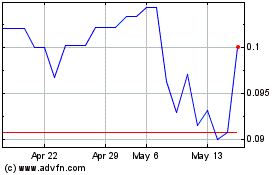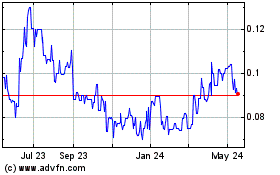Tinka Drills 12 Metres of 4.22% Zinc and Intercepts Mineralization to the Northeast at Ayawilca Project, Peru
December 18 2013 - 7:30AM
Marketwired
Tinka Drills 12 Metres of 4.22% Zinc and Intercepts Mineralization
to the Northeast at Ayawilca Project, Peru
VANCOUVER, BRITISH COLUMBIA--(Marketwired - Dec 18, 2013) -
Tinka Resources Limited
(TSX-VENTURE:TK)(PINKSHEETS:TKRFF)(FRANKFURT:TLD) (the "Company")
announces the analytical results for holes A13-10 to A13-13 and
visual results for holes A13-15 to A13-17 drilled at the Company's
100% owned Ayawilca project, located in west-central Peru. See
table below for a list of significant mineralized intervals.
Mr. Carter said: "The Company is pleased with these intercepts
of zinc mineralization as they continue to demonstrate the
potential of the Ayawilca project. Of great interest are the visual
results of hole A13-16 and A13-17 which were collared 570 metres to
the northeast of hole A12-08. This is a significant step as it
confirms the presence of mineralization a substantial distance from
previous drilling."
Hole A13-15 is located on section 333300E, about 100 m west of
the significant intercept of 70 m of 4.8% zinc found in hole A12-08
(see press release dated Jan. 8, 2013.) Massive and semi-massive
sulphides were intersected between 321.1 m and 344.4 m depth with
locally moderate concentrations of sphalerite in a matrix dominated
by pyrite and pyrrhotite.
Drill holes A13-16 and A13-17 were collared along section
333900E, about 570 m northeast of A12-08. Both of these holes
targeted an area where old workings are located along mineralized
fault structures that cut the overlying sandstone formation. In
addition, this site is also along the western margin of large
coincidental magnetic and chargeability (IP) anomalies measuring
about 700 m east-west and 700 m north-south, respectively.
In hole A13-16 (-60 degrees north), semi-massive sulphides were
intersected between 354.9 m and 359.1 m and consisted of sphalerite
and pyrite associated with strong chlorite and moderate magnetite
alteration. Semi-massive sulphides, consisting of weak to moderate
sphalerite mineralization, accompanied by strong chlorite and
moderate magnetite alteration occurs between 376.3 m and 394.1 m
and again from 436.0 m to 436.4 m and from 440.6 m to 443.5 m. The
massive pyrrhotite horizon found above the metamorphic basement
rocks in many of the holes is absent here.
Semi-massive sulphides (pyrite and sphalerite), along with
moderate chlorite and magnetite alteration, occur between 329.6 m
and 352.6 m depth in hole A13-17 (-75 degrees north). Sphalerite,
plus some galena, were found between 373.1 m and 378.9 m with the
same style of alteration. Massive pyrrhotite, containing pyrite,
sphalerite and lesser chalcopyrite, occurs from 380.1 m and 405.6 m
depth.
Hole A13-12A (Section 333700E) intercepted large intervals of
intense chlorite and argillic alteration admixed with sulphides.
This may be an indication that another strongly mineralized plume,
like that encountered in holes A12-08 and A13-05, may present
nearby. This area is being considered for further drill
testing.
Except for A13-13, all returned moderately to highly anomalous
copper values near the bottoms of the holes.
The Company cautions that visual results for these holes are
preliminary and the Company is waiting for assay results to
determine the level of mineralization intercepted. Assay results
for holes A13-14 to A13-17 are expected to be available in early
January 2014.
Significant mineralized intervals using 15 g/t Ag, 1% Pb and 1%
Zn as lower cut-off levels are shown below:
|
Hole # |
Easting (m) |
Northing (m) |
Elev (m) |
Azimuth (deg) |
Dip (deg) |
Depth (m) |
From (m) |
To (m) |
Interval (m) |
Ag (g/t) |
Cu (%) |
Pb (%) |
Zn (%) |
|
A13-10 |
333500 |
8845870 |
4168 |
360 |
-70 |
326.1 |
100 |
101.4 |
1.4 |
156 |
-- |
2.83 |
14.02 |
|
|
|
|
|
|
|
|
156 |
160 |
4 |
-- |
-- |
-- |
2.06 |
|
|
|
|
|
|
|
|
164 |
168 |
4 |
-- |
-- |
-- |
1.25 |
|
|
|
|
|
|
|
|
172 |
173.7 |
1.7 |
62.6 |
-- |
4.60 |
4.05 |
|
|
|
|
|
|
|
|
238 |
240 |
2 |
-- |
-- |
-- |
2.41 |
|
|
|
|
|
|
|
|
248 |
254 |
6 |
-- |
-- |
-- |
2.06 |
|
|
|
|
|
|
|
|
304 |
306 |
2 |
-- |
-- |
-- |
1.76 |
|
|
|
|
|
|
|
|
308 |
310 |
2 |
-- |
-- |
-- |
1.40 |
|
A13-11 |
333500 |
8845870 |
4168 |
180 |
-70 |
344.2 |
148 |
152 |
4 |
-- |
-- |
-- |
1.86 |
|
|
|
|
|
|
|
|
154 |
160 |
6 |
-- |
-- |
-- |
3.06 |
|
|
|
|
|
|
|
|
162 |
164 |
2 |
-- |
-- |
-- |
1.31 |
|
|
|
|
|
|
|
|
170 |
172 |
2 |
-- |
-- |
-- |
1.21 |
|
|
|
|
|
|
|
|
179.2 |
184 |
4.8 |
-- |
-- |
-- |
2.42 |
|
|
|
|
|
|
|
|
330 |
332 |
2 |
76.7 |
2.07 |
-- |
-- |
|
A13-12A |
333691 |
8846005 |
4133 |
180 |
-70 |
356.8 |
148.7 |
152 |
3.3 |
-- |
-- |
-- |
4.57 |
|
|
|
|
|
|
|
|
154 |
156 |
2 |
-- |
-- |
-- |
1.31 |
|
|
|
|
|
|
|
|
162 |
164 |
2 |
-- |
-- |
-- |
2.34 |
|
|
|
|
|
|
|
|
172 |
178 |
6 |
-- |
-- |
-- |
5.83 |
|
|
|
|
|
|
|
|
184 |
186 |
2 |
49.3 |
-- |
2.2 |
1.75 |
|
|
|
|
|
|
|
|
196 |
198 |
2 |
-- |
-- |
-- |
2.97 |
|
|
|
|
|
|
|
|
212 |
216 |
4 |
-- |
-- |
-- |
5.08 |
|
|
|
|
|
|
|
|
218 |
226 |
8 |
-- |
-- |
-- |
2.19 |
|
|
|
|
|
|
|
|
228 |
232 |
4 |
-- |
-- |
-- |
1.23 |
|
|
|
|
|
|
|
|
238 |
240 |
2 |
-- |
-- |
-- |
2.56 |
|
|
|
|
|
|
|
|
250 |
268 |
18 |
-- |
-- |
-- |
3.84 |
|
|
|
|
|
|
|
|
280 |
292 |
12 |
-- |
-- |
-- |
4.22 |
|
|
|
|
|
|
|
|
302 |
310 |
8 |
-- |
-- |
-- |
2.09 |
|
|
|
|
|
|
|
|
312 |
316 |
4 |
-- |
-- |
-- |
2.13 |
|
|
|
|
|
|
|
|
318 |
320 |
2 |
-- |
-- |
-- |
2.11 |
|
A13-13 |
333797 |
8845950 |
4118 |
180 |
-65 |
386.8 |
172 |
174 |
2 |
-- |
-- |
-- |
1.89 |
|
|
|
|
|
|
|
|
180 |
182 |
2 |
-- |
-- |
-- |
1.30 |
|
|
|
|
|
|
|
|
188 |
194 |
6 |
-- |
-- |
-- |
3.42 |
|
|
|
|
|
|
|
|
200 |
202 |
2 |
81.7 |
-- |
-- |
-- |
|
|
|
|
|
|
|
|
214 |
216 |
2 |
34.2 |
-- |
-- |
-- |
|
|
|
|
|
|
|
|
218 |
222 |
4 |
29.1 |
-- |
1.06 |
-- |
|
|
|
|
|
|
|
|
375.1 |
377 |
1.9 |
-- |
-- |
-- |
1.44 |
The geometry of and controls to the mineralization are not yet
fully understood, but a series of intersecting fault structures
that underlie Ayawilca are believed to be the source conduits. The
3-D inversion anomalies follow these structures closely. The
irregular nature of this replacement style mineralization hampers
any meaningful interpretation of the strike, dip and true thickness
of the zone(s), intercepted in these and previously reported drill
holes, at this time.
Readers are invited to visit the Company's website to view
diagrams of the drill hole locations and geophysical anomalies in
the corporate and technical presentations.
All diamond drilling has been performed using HQ diameter drill
rods, reducing to NQ diameter if required. All core has been logged
and split on site under the supervision of Tinka geologists with
sampling done on nominal two metre intervals. All the samples have
been transported by Company staff to SGS Laboratories in Lima,
Peru, for ICP analyses using multi-acid digestion. Analytical
standards and blanks were routinely introduced in the sample suites
sent to the laboratory, and samples that exceeded their respective
threshold levels for Ag, Zn and Pb were re-assayed by specific
atomic absorption techniques.
The qualified person for the Company's projects, Mr. John
Nebocat (P.Eng.), V.P. of Exploration for the Company, has reviewed
and approved the contents of this news release.
About Tinka Resources Limited (TSX-VENTURE:TK):
Tinka is a junior resource acquisition and exploration company.
Tinka's focus is on its 100% owned Colquipucro and Ayawilca
projects located in the highly mineralized silver-lead-zinc belt of
Central Peru.
On behalf of the Board,
Andrew Carter, President & CEO
Forward-Looking
Statements: This Company news release contains certain
"forward-looking" statements and information relating to the
Company that are based on the beliefs of the Company's management
as well as assumptions made by and information available to the
Company's management as of the date of this news release. Such
statements reflect the current risks, uncertainties and assumptions
related to certain factors including, without limitations,
competitive factors, general economic conditions, customer
relations, relationships with vendors and strategic partners
including local communities and landholders, the interest rate
environment, governmental regulation and supervision, seasonality,
technological change, changes in industry practices, and one-time
events. Should any one or more of these risks or uncertainties
materialize, or should any underlying assumptions prove incorrect,
actual results may vary materially from those described herein.
Neither the TSX Venture Exchange nor its Regulation Services
Provider (as that term is defined in the policies of the TSX
Venture Exchange) accepts responsibility for the adequacy or
accuracy of this news release.
Tinka Resources LimitedCompany Contact:Mariana
Bermudez604-699-0202mbermudez@chasemgt.comTinka Resources
LimitedInvestor Information:Reg
Advocaat604-219-8911radvocaat@tinkaresources.comwww.tinkaresources.com
Tinka Resources (QB) (USOTC:TKRFF)
Historical Stock Chart
From Feb 2025 to Mar 2025

Tinka Resources (QB) (USOTC:TKRFF)
Historical Stock Chart
From Mar 2024 to Mar 2025
